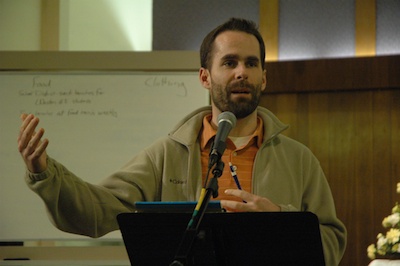ARLINGTON — The Arlington United Church’s community forum on homelessness on Feb. 26 drew input from a broad range of regional experts on issues closely related to homelessness.
Arlington School District Superintendent Dr. Kristine McDuffy was joined by Sid Logan, executive director of the district’s operations and facilities, and Diane Kirchner-Scott, executive director of its teaching, learning and special services, in explaining how their running tallies of students within the school district who qualify as homeless are determined according to criteria set by the state Office of Superintendent of Public Instruction.
“We err on the side of the children with our numbers,” Kirchner-Scott said.
“The most important thing is to try and ensure some stability for these children, who are often moving between schools in the midst of their turmoils,” McDuffy said.
Mary Jane Brell Vujovic, director of strategic initiatives for the Workforce Development Council of Snohomish County, commended the number of “excellent programs” that have been created specifically to address the needs of the homeless, but acknowledged that there remain significant gaps between these resources and the people who need them.
“Between July of 2011 and July of 2012, 75 families have gone through our pilot program for coordinated entry, starting in Everett and Monroe,” said Brell Vujovic, who summed up the program’s goals as getting the homeless rehoused quickly, addressing the needs that caused them to become homeless in the first place, and addressing multiple needs at once. “It won’t go fully live until July of this year, but we hope to have expanded into Arlington by then. We’re going to try and get these people to their optimal self-sufficiency.”
Arlington United Church Pastor Deena Jones touched upon the local portable cold-weather shelter, which has served 22 different people over the course of 26 separate nights since the start of winter last year.
Housing Hope Regional Manager Nate Greenland followed by pointing out how minimum wage runs about $9 an hour, while paying for a two-bedroom apartment with groceries costs an average of $20.31 an hour.
“Some people think the homeless just need to be less lazy or better at managing their budgets,” Greenland said. “What we consider common sense in those areas is the cumulative result of 18 years of upbringing, though. We need to address the chronic issues that led to their homelessness, whether it was chemical dependency, unemployment or escaping an abusive relationship.”
In the midst of touting life skills and employment classes, Greenland echoed Brell Vujovic’s assertion that a regional multi-service center represents a huge stride forward in dealing with homelessness and a number of associated problems.
Julio Cortes, outreach and “U-Turn” supervisor for Cocoon House, reported that Cocoon House is in the process of opening a group maternity home for up to seven mothers in the area, in addition to its services for at-risk youth aged 13-17, as well as its transitional shelter for those as old as 18.
“We’ll do what we can to help them get their GEDs, get into high school or college, and fill out their resumes,” Cortes said. “We want them to get their feet back under them.”
Among the suggestions submitted by forum attendees to deal with homelessness were more bus lines, a drop-in center with showers and laundry, places for the homeless to park the cars or RVs that they live in, free seeds for fruits and vegetables, further mentoring programs for youth, drug rehabilitation access and mental health services.
Arlington Mayor Barbara Tolbert rounded out the evening by joining the call for a centralized location in Arlington for the homeless to receive assistance.
“How many of us learned about organizations or services that we didn’t even realize existed before tonight?” Tolbert asked the audience, before laughing, “I like to think I know everything, but I certainly didn’t know all this.”
For more information on the next community action on homelessness, email homeless@auc1.org or log onto www.auc1.org/homeless.







